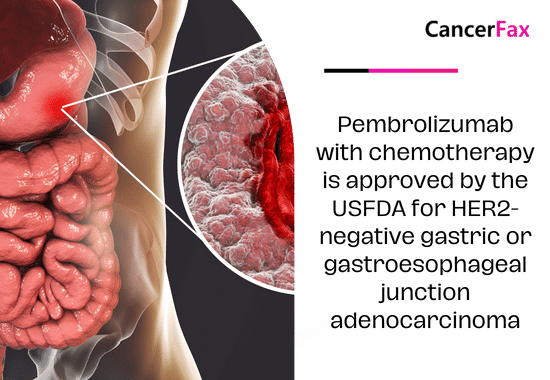Pembrolizumab with chemotherapy is approved by the USFDA for HER2-negative gastric or gastroesophageal junction adenocarcinoma
The Food and Drug Administration approved pembrolizumab (Keytruda, Merck) in combination with fluoropyrimidine- and platinum-containing chemotherapy on November 16, 2023. This approval is for the initial treatment of adults with locally advanced unresectable or metastatic HER2-negative gastric or gastroesophageal junction (GEJ) adenocarcinoma.
The effectiveness was assessed in a multicenter, randomized, double-blind, placebo-controlled experiment called KEYNOTE-859 (NCT03675737). The trial included 1579 patients with HER2-negative advanced gastric or GEJ adenocarcinoma who had not undergone systemic therapy for metastatic illness before. Participants were randomly assigned to receive either pembrolizumab 200 mg or a placebo along with the investigator’s choice of combination chemotherapy, which included either cisplatin 80 mg/m2 plus 5-FU 800 mg/m2/day for 5 days (FP) or oxaliplatin 130 mg/m2 on Day 1 plus capecitabine 1000 mg/m2 twice a day for 14 days (CAPOX) in each 21-day cycle.
The primary efficacy measure was overall survival (OS). The study also evaluated progression free survival (PFS), overall response rate (ORR), and duration of response (DOR) through a blinded independent central review (BICR) based on RECIST v1.1 criteria, with a limit of 10 target lesions and 5 target lesions per organ.
Pembrolizumab combined with chemotherapy led to a statistically significant enhancement in overall survival (OS), progression-free survival (PFS), and objective response rate (ORR). The median overall survival was 12.9 months (95% CI: 11.9, 14.0) with pembrolizumab and 11.5 months (95% CI: 10.6, 12.1) with placebo. The hazard ratio (HR) was 0.78 (95% CI: 0.70, 0.87) with a p-value of <0.0001. The median progression-free survival (PFS) was 6.9 months (95% CI: 6.3, 7.2) and 5.6 months (95% CI: 5.5, 5.7) in the two groups, with a hazard ratio (HR) of 0.76 [95% CI: 0.67, 0.85] and a p-value of <0.0001. The objective response rate (ORR) was 51% (95% CI: 48, 55) and 42% (95% CI: 38, 45) with a statistically significant p-value of less than 0.0001 in the two treatment groups. The median duration of response (DOR) was 8 months (95% CI: 7.0, 9.7) for pembrolizumab and 5.7 months (95% CI: 5.5, 6.9) for placebo.
An additional study showed that patients who were given pembrolizumab and had tumors that expressed PD-L1 CPS > 1 and CPS ≥ 10 had statistically higher overall survival (OS), progression-free survival (PFS), and objective response rate (ORR).
15% of patients experienced permanent cessation of pembrolizumab treatment due to adverse effects. Adverse effects leading to permanent cessation in at least 1% of cases included infections and diarrhea.
The suggested dosage for pembrolizumab is 200 mg every 3 weeks or 400 mg every 6 weeks until disease progression or intolerable toxicity. Administer pembrolizumab before chemotherapy if they are given on the same day.
Susan Hau is a distinguished researcher in the field of cancer cell therapy, with a particular focus on T cell-based approaches and cancer vaccines. Her work spans several innovative treatment modalities, including CAR T-cell therapy, TIL (Tumor-Infiltrating Lymphocyte) therapy, and NK (Natural Killer) cell therapy.
Hau's expertise lies in cancer cell biology, where she has made significant contributions to understanding the complex interactions between immune cells and tumors.
Her research aims to enhance the efficacy of immunotherapies by manipulating the tumor microenvironment and exploring novel ways to activate and direct immune responses against cancer cells.
Throughout her career, Hau has collaborated with leading professors and researchers in the field of cancer treatment, both in the United States and China.
These international experiences have broadened her perspective and contributed to her innovative approach to cancer therapy development.
Hau's work is particularly focused on addressing the challenges of treating advanced and metastatic cancers. She has been involved in clinical trials evaluating the safety and efficacy of various immunotherapy approaches, including the promising Gamma Delta T cell therapy.
- Comments Closed
- March 3rd, 2024






Advanced GI cancer options, FDA-approved regimen 2024, First-line gastric therapy, HER2-negative GEJ treatment, Immunochemotherapy breakthrough, Keytruda chemotherapy combination, PD-1 inhibitor for adenocarcinoma, Pembrolizumab gastric cancer approval
CancerFax is the most trusted online platform dedicated to connecting individuals facing advanced-stage cancer with groundbreaking cell therapies.
Send your medical reports and get a free analysis.
🌟 Join us in the fight against cancer! 🌟
Привет,
CancerFax — это самая надежная онлайн-платформа, призванная предоставить людям, столкнувшимся с раком на поздних стадиях, доступ к революционным клеточным методам лечения.
Отправьте свои медицинские заключения и получите бесплатный анализ.
🌟 Присоединяйтесь к нам в борьбе с раком! 🌟